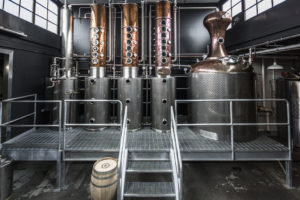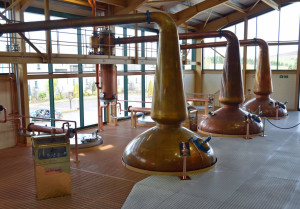The introduction of advanced technology in whiskey production has revolutionized traditional methods, offering a unique learning experience for aspiring students. Automation and digital tools have streamlined processes, ensuring precision and quality control in every stage of production.
Significance of innovative spirits in the alcohol industry
Innovative spirits play a crucial role in shaping the future landscape of the alcohol industry. With evolving consumer preferences and demand for unique products, distilleries are leveraging technology to create innovative flavor profiles and sustainable practices. Brands that embrace innovation stand out in a competitive market by offering exceptional products that cater to changing tastes.
Traditional Whiskey Production
Brief history of whiskey production methods
The history of whiskey production is steeped in tradition, with manual sorting, traditional copper stills, and hand-bottling processes being the norm for centuries. These methods required skilled craftsmen to oversee every detail of the production process.
Challenges faced by traditional distilleries in the modern era
Traditional distilleries face challenges in keeping up with modern technology-driven advancements, prompting a need to “write my essay with best writers” who can articulate the transition towards automation. The reliance on manual labor can lead to inefficiencies and inconsistencies in quality control. Adopting new technology like automated systems, stainless steel fermentation tanks, and bottling lines with robotics is crucial for enhancing efficiency and meeting the demands of a rapidly evolving market.
Technology in Whiskey Production
Role of automation in streamlining whiskey distillation processes
In the realm of whiskey production, automation plays a crucial role in streamlining distillation processes. By incorporating automated systems, distilleries can enhance efficiency and consistency in their operations. Automation helps in precise temperature control during fermentation and distillation phases, leading to a more uniform product quality. Additionally, automated monitoring systems ensure adherence to strict production standards.
Innovative tools and equipment used in modern distilleries
Modern distilleries have embraced innovative tools and equipment to improve production outcomes. Stainless steel fermentation tanks provide better hygiene and control over the fermentation process. Robotic bottling lines streamline packaging operations with increased speed and accuracy. Furthermore, sophisticated analytical instruments aid in monitoring various parameters to achieve desired flavor profiles efficiently. These advancements showcase the industry’s commitment to blending tradition with technology for optimal results.
Data Analytics and Whiskey Flavor Profiling
Utilizing data analytics to enhance flavor profiling in whiskey production
In the context of whiskey production, the use of data analytics has become instrumental in enhancing flavor profiling. Through data analysis, distilleries can gain insights into factors affecting taste profiles and make informed decisions to achieve desired flavors consistently. By leveraging this technology, distilleries can monitor trends, experiment with different variables, and optimize processes for superior product quality.
Importance of maintaining consistency in whiskey taste
Consistency is paramount in the world of whiskey as it ensures that consumers receive the same high-quality experience with every bottle. By incorporating data analytics to maintain consistency in taste profiles, distilleries can uphold their reputation and meet consumer expectations effectively. This focus on consistency not only reinforces brand loyalty but also drives innovation and continuous improvement within the industry.
Sustainable Practices in Whiskey Distilleries
Adoption of eco-friendly practices in whiskey production
In whiskey distilleries, the adoption of sustainable practices plays a crucial role in minimizing environmental impact. By incorporating eco-friendly approaches such as recycling water, using renewable energy sources, and reducing waste generation, distilleries can decrease their carbon footprint and contribute to a greener future. This shift towards sustainability not only benefits the environment but also promotes cost efficiency and resource conservation within the industry.
Impact of sustainability on the next generation of students entering the industry
The emphasis on sustainability in whiskey production influences the mindset of new entrants into the industry. As students are exposed to environmentally conscious practices during their education, they are more likely to prioritize sustainability when embarking on their careers in distilleries. This focus on sustainable operations fosters a culture of responsibility and innovation among future professionals, driving continuous improvements towards a more environmentally friendly and socially responsible sector.
Future Trends in Whiskey Production
Exploring upcoming technological trends shaping the future of whiskey distillation
In whiskey distilleries, sustainability practices are increasingly being embraced to reduce environmental impact. Eco-friendly methods, including water recycling and renewable energy usage, lower carbon footprints. This movement encourages cost-effective operations and resource preservation. The implementation of sustainable approaches not only benefits the environment but also leads to economic advantages for the distilleries themselves.
The focus on sustainability in whiskey production is altering students’ perspectives as they enter the industry. Exposure to eco-conscious techniques during education cultivates a mindset that prioritizes sustainability in their professional endeavors. This emphasis on responsible practices fosters innovation among new entrants, propelling the industry towards greater environmental friendliness and social responsibility.
Conclusion
Summary of key takeaways on the impact of technology on whiskey production
In whiskey distilleries, the adoption of eco-friendly methods and sustainable practices is revolutionizing traditional production processes. This shift towards environmental consciousness not only reduces carbon footprints but also enhances operational efficiency and cost-effectiveness.
Inspiring the next generation of students to pursue careers in innovative spirits
The emphasis on sustainability in whiskey production is shaping the mindset of aspiring industry professionals. Exposure to responsible practices during education instills a commitment to eco-conscious techniques, fostering innovation and driving the industry towards greater environmental friendliness.
 The Whiskey Reviewer A World of Whiskey, Poured Every Weekday
The Whiskey Reviewer A World of Whiskey, Poured Every Weekday



